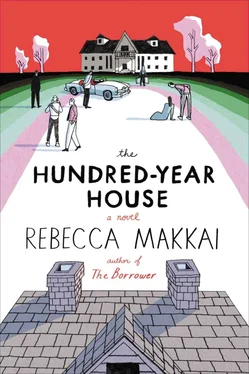A creak traveled across the attic floor, and shook her awake. She didn’t know how long she’d been staring at that file, and she became disgusted that she’d spent her afternoon painting in someone else’s version of the sky and dwelling on the minutiae of twenty years ago, when she might deal with Max. George was out of the way, and even the witch was off at the museum.
She rested the files on one of the cabinets, and got her coat from the hook at the top of the stairs. But here was Max, after all, coming to find her, knocking at the door below. Or at least someone was, and she assumed it was Max, not Mrs. Carmichael, from the quick confidence of the raps. She trotted down, but when she opened the door the whole hall was empty. She looked in the flowered bedroom on the right, and in the guest suite to the left, but there was no one. Ridiculous child, to get goose bumps on her arms. It was the acorns, of course. They’d been falling all week, pelting the windows and roof.
Without thinking she started back up, as if that had been her mission all along, and it wasn’t till she got to the top that she remembered Max. But meanwhile the files had all spilled down from the top of the cabinet, onto the Morris chair and floor. She sorted what she could: the letters, some slides, a postcard from poor, luggageless Alma Nellis. Sticking halfway out from the top of a folder that read Parfitt, Edwin, was a photograph. She pulled it out. A revolting photograph, the kind she knew existed, the kind she’d glimpsed in boxes of postcards at the bouquinistes by the Seine, but it was never men , and never so anatomical . She dangled it upside down between her thumb and finger. There was nothing else in the Edwin Parfitt file, and nothing else that seemed to belong there. She turned the photo right side up so she could properly read the expressions on the two men’s faces. The one on the left was grinning like the devil. The one on the right: Oh, oh, oh. The man on the right was her father.
—
Down in the library, she poured herself a glass of George’s scotch. She preferred to taste something harsh and stinging just then. She didn’t know what to do with herself, besides crawl out of her own skin.
She moved the little jade monkey from a bookshelf to the top of the bar, as if it were contemplating what to drink next. It was one of the few items she remembered from her childhood visits to Laurelfield, and she’d been delighted to find it still in the library. What she remembered was a plump, friendly woman pressing it into her hand, saying, “We haven’t many toys here, but this might do.”
She drank one more glass of scotch and waited till she could feel it in her cheekbones, and then she marched off to the coach house, the photograph in her coat pocket.
—
She found Max in the garage, washing the windshield of the Darrin. It was a ridiculous car, two seats only, pale yellow with a puckered grille in front, sliding doors and a sliding roof that always got stuck halfway open. And George had been one of the only saps in the world to buy the thing.
“Max,” she said. “I want to inquire about your guest.”
He stopped and folded the rag. “I do apologize. That’s Miss Silverman. An old friend of the colony.” But he wasn’t apologizing at all, really, and his brazenness brought her up short. For such a tiny, quiet man, he was awfully sure of himself. “Are you feeling all right, Mrs. Grant? Perhaps you’ll take a seat.” He indicated the passenger side of the Darrin, but she knew she’d have to remain standing if she wanted to show any authority at all.
“So she’s an artist.”
“Just a friend of the colony.”
“Then she must hate me.”
He smiled far too kindly. “None of us bears you ill will, Mrs. Grant. You needed a place to live.”
“Do you know the irony?” she said. “I’m the only one of my family who ever loved this place. I came here several times as a child. I remember the dog. Miss Mays, the director, had a wonderful sort of walrusy dog.”
“Alfie.”
“Yes! It was Alfie!”
“He’s buried back in the woods.”
“Oh, he’s — Oh, now I’m sad and I don’t even know why. You’ll have to show me, sometime, where he is. You must have been here then yourself, but I don’t remember.”
“I was lower on the totem pole, at the time. Lawn care and such.” He gestured, again, to the seat, and she wondered if she’d really gone that pale, or if maybe she’d smeared blue paint on her face without realizing. She gave in this time, and slid the little door, and sat. Max came around so he wasn’t looking at her through the glass.
“And do you know, I always thought that when I was grown I’d come stay here. That I’d be an artist, and I’d show up with an assumed name, and no one would know. Sometimes I think it was a horrible mistake to tell my father so. What if he closed it all down just to spite me? And then sent me here to babysit the corpse. But I had to live somewhere. And I knew if I didn’t come take it, he’d put it up for sale.”
“There were offers,” Max said.
“Max, do you suppose there’s something wrong with him? With my father? I think I’ve just realized that I don’t know him at all.”
He said, “I can’t speak ill of my employer.”
“But how well do you know him? How long have you known him?”
“We were never great friends.”
She put her head down on the dashboard. “Do you know what I want? I want to start all over again with a different name. I want amnesia, I think. I’d like to wake up in some city like San Francisco with no idea who I am.”
He was quiet a moment and then quickly, as if he’d been working up the courage to ask it: “Have you heard of the poet Edwin Parfitt?”
Her blood reversed direction in her limbs. Yes, she’d heard of him not twenty minutes ago, and he was now committing an act of sodomy in her coat pocket. “Just recently,” she said.
Max made a little cluck. “I’m surprised. He’s horribly out-of-date. I have something for you. Please don’t leave.” And he scurried around the corner and up the stairs to the living quarters.
She worked out what she’d ask him when he came down, and the way she might hand the picture to him. But he was gone quite a long time, and when he finally returned the witch was behind him. When had she returned? Grace was upset with herself for missing it.
She climbed out of the car and struggled for balance.
Max said, “Allow me a belated introduction. My dear friend Zilla Silverman.”
She extended a hand. “Miss Silverman,” she said. “I do hope you enjoyed the museum.”
And she immediately took it all back about this woman looking like a witch. Her eyes were kind and pale blue, a liquid blue, and there was something noble about her, the way she held her shoulders, the way she clasped Grace’s hand. She said, “I’m absolutely taken with this little car behind you. It looks made of butter, doesn’t it?”
Grace stepped aside so Miss Silverman could view it better. “It’s pretty from the side, but from the front it has a pushed-in pig face. My husband paid far too much. It’s made of fiberglass. Doesn’t that sound like it would shatter from just a pebble?”
“What’s it called? No, don’t tell me. The Elegant Swine. The Zippy Creampuff!”
“The Gilded Lily,” Grace said, and she was thrilled when Miss Silverman laughed. She found that she very much wanted this woman to like her.
“It does have the funniest face on the front. The Pucker-Up-and-Kiss-Me-Quick. What is it called?”
“The Kaiser-Darrin.”
“Oh, it’s German!”
“No, no, George would never.” She knew what she was implying, what she’d often implied back in Toronto — that George had served — when really he’d spent the war years scooping up young widows like candy from a piñata. But she found that the implication excused his behavior somewhat. And if this Zilla Silverman planned on staying for any length of time, she was sure, sooner or later, to see George at his worst. It was true though that he’d never buy a German car.
Читать дальше












